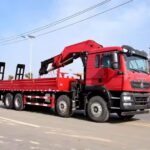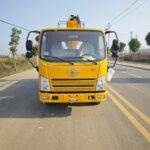When constructing the track foundation for tower cranes, it is sometimes necessary to install curved tracks at one or both ends of a straight track. This allows the crane to smoothly transition and continue its lifting operations across different construction areas. Such a requirement typically arises under two main conditions:
- Complex Project Design: When the engineering object has a complex shape, a straight track must incorporate a curve to connect with another track that is either perpendicular or parallel.
- Residential Construction Projects: In residential complexes, tower cranes often need to move to a new building site upon the completion of one project phase, without undergoing dismantling and reassembly.
The radius of these curves is influenced primarily by several factors: the crane’s track gauge and wheelbase, the structure of the crane’s traveling chassis (whether it is a crab-type, hinged-leg gantry, cross-type, or X-type chassis), and the configuration of the traveling trolley (including its ability to pivot around a vertical axis, the width of the rolling surface of the wheels, and whether the driving trolley is positioned on the inside or outside of the curve).
Methods of Laying Curved Tracks
Laying curved tracks involves shaping the rails to a specific curvature radius. Two main methods are used:
- Hot Bending Method: This involves using a jig to heat and bend the rails into the desired shape. This method requires careful control of temperature and pressure to ensure the rails maintain structural integrity.
- Cold Bending Method: Utilizing a hydraulic rail bender, this method applies incremental pressure points along the straight rail to bend it into the required curvature. This method is more straightforward and is often preferred for its simplicity.
Currently, the most accessible method is the chain block bending method, which involves the following process:
- On-site Bending and Installation: The bending is performed directly at the construction site in coordination with the tower crane. As the rail is bent, it is simultaneously laid and fixed in place.
- Simple Tool Requirement: This method requires minimal equipment, including steel cables, clamps, shackles, two anchor piles, and a 2-ton chain block.
- Segmented Inspection: Wooden templates are used to check the curvature radius of the rails in segments, ensuring quality and precision during bending.
- Segmental Construction: Each bending segment measures approximately 500 to 600 mm. The segments are bent and fixed progressively, allowing the tower crane to gradually transition from the straight track to the curved section.
Important Considerations for Curved Track Installation
When installing curved tracks, it is essential to adhere to the following guidelines to ensure safety and functionality:
- Sleeper Spacing: The spacing of sleepers on the outer side of the curve should be reduced compared to straight track sections. The number of sleepers on the outer rail should be double that on the inner rail to provide additional support.
- Steel Tie Bars: Increase the number of steel tie bars between the inner and outer rails to maintain the correct track gauge through the curve.
- Rail Elevation: The height difference between the tops of the inner and outer rails in the curve should not exceed 1/1000 of the track gauge, ensuring stability and smooth operation.
- Secure Fixing: Rails must be firmly secured using rail spikes to prevent movement and ensure the track’s integrity.
- Ballast Laying: The curve section should be fully ballasted. Adequate ballast should be placed under the sleepers of the outer rail and bordered with brick masonry to provide stability.
- Curvature Radius Selection: The curvature radius must be selected based on the specific characteristics of the project to ensure that the crane can safely and efficiently operate along the curve.
Enhancing Safety and Efficiency
In addition to the technical aspects of track installation, safety and operational efficiency are paramount. Here are additional considerations and practices to enhance these aspects:
- Regular Inspections: Conduct regular inspections of the track and its components to identify and address any potential issues that could compromise safety or operational efficiency.
- Training and Awareness: Ensure that all personnel involved in the installation and operation of the tower crane are adequately trained in safety protocols and the specific procedures for handling curved tracks.
- Environmental Considerations: Assess the environmental impact of track installation and operation, including factors such as soil stability and potential disruptions to nearby residential or commercial areas.
- Coordination with Other Construction Activities: Plan and coordinate track installation with other construction activities to prevent conflicts and ensure that all site operations proceed smoothly.
By comprehensively understanding the technical requirements and safety considerations associated with the installation of curved tracks for tower cranes, construction teams can ensure a safe, efficient, and effective lifting operation across various construction sites.












